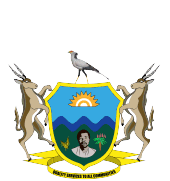
The King Sabata Dalindyebo Municipality had a 3-day strategic planning meeting at the Savoy Hotel in Mthatha on March 11–13, 2024.
The objectives of the session were to assess institutional performance and to align municipal plans with other development plans of government. The gathering also aimed to discuss strategies to tackle the issues the Municipality is facing in order to better serve all KSD communities.

In her welcoming remarks, the Honourable Speaker of Council, Cllr. Nomamfengu Siyo-Sokutu, stated that the goal of strategic planning is to ensure that the Municipality comes up with a common vision for the future of the Municipality. “We shall forever be grateful that our Municipality has a lot of opportunities that we can explore to uplift our economy and be in a position that we think it is supposed to be.” She said. She went on to urge everyone to take responsibility for protecting the environment for future generations.
“It is important to note that each one of us has a role to play in saving our environment. The reckless disposal of waste remains a major challenge.” She continued saying, “This has been a cry, and the municipality is making strides to stop this behaviour. It means that all of us as a community must take responsibility and devise a plan to stop the illegal dumping of waste.”

“This is a major threat to our environment, which will affect the third generation to come. If we destroy the environment, what will be left for future generations? We must ask ourselves that question.”
She further mentioned the issue of crime as a major challenge faced by the Municipality and that strategic planning should come up with an implementable plan to prevent and reduce crime in KSD.
In conclusion, the Speaker commended the council members for the general stability within the council and its focus on serving the citizens of KSD Municipality instead of fighting each other.

Executive Mayor, Cllr. Nyaniso Nelani, gave a political overview of the Municipality and stated that the session is a platform to assess the progress of the Municipality towards its mandate of improving the quality of life for KSD communities. “We must assess ourselves where we are, according to our KSD Vision 2030, which is a blueprint for the development of KSD Municipality.” He emphasized that the session should discuss and plan for the issues raised by the Municipal Demarcation Board (MDB) on KSD application for metropolitan status to be unsuccessful.
“We must continue to engage on our development target and identify our shortcomings as far as the metro is concerned.” He further stressed the issue of crime that affects everyone in society and that the gathering should craft a clear plan to combat crime, as well as the issue of electricity theft through illegal connections and meter tempering, which remains a challenge. “Another pressing issue is the crisis of an organized group that is planning to destroy our electricity infrastructure. The kiosks are being set on fire and destroyed almost every day. That is a disaster, and we cannot sustain such destruction.”

In closing, he stated that the Municipality should make sure that the plans of the Municipality are in line with the plans of the national and provincial government as tabled in the State of the Nation Address (SONA) and State of the Province Address (SOPA).
“KSD is the third-largest economy in the Eastern Cape, and we need to take advantage of national and provincial government support in the form of the District Development Model (DDM) towards the implementation of KSD catalytic projects that will benefit the economy and create jobs.”
He encouraged everyone to contribute to transforming and reshaping KSD Municipality.

Presenting the administrative overview, the Municipal Manager, Mr. Ngamela Pakade, presented the status of the Municipality and future plans. His presentation covered the financial performance of the municipality, institutional performance, staff establishment, status of governance, key catalytic initiatives and proposed Municipal Turn Around Strategy.
Catalytic projects that are on pipeline and some on implementation stage were unpacked. These projects include:
- Mega housing project which will include social housing, middle income, community flats and stand-alone houses.
- Cleanest ward competition in order to encourage wards to keep their area clean.
- The revitalisation of railway line between Stutterheim and Mthatha.
- Construction of offices in Coffee Bay with the purpose of developing Coffee Bay town.
- Development of the Special Economic Zone (SEZ) and Viedgesville Logistic Hub.
- The development of the Mamela Taxi Rank, which will feature a shopping mall.
- Renewing of road infrastructure in Mthatha and Mqanduli, working together with MISA and DBSA.
- Ngangelizwe precinct and container city development through leveraging the Neighbourhood Grant.
- Plans to have public Wi-Fi in town as part of smart city development and
- Enforcement of traffic bylaws through the introduction of a traffic ticket collection bus and parking system.
Various stakeholders and sector departments formed part of the planning session.
Extensive deliberations were made with resolutions on issues related to governance, institutional transformation, infrastructure, public safety, community services and economic development.
